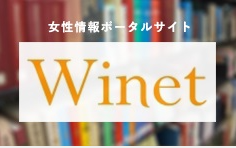International Cooperation
- HOME
- International Cooperation
- International Seminar
- FY2018 Seminar for Gender Equality Officers and Women Leaders in the Asia Region
International Seminar
- Event Report
-
FY2018 Seminar for Gender Equality Officers and Women Leaders in the Asia Region
Date:October 2 to 6, 2018
From October 2nd to October 6th, The National Women’s Education Center (NWEC) held the FY2018 Seminar for Gender Equality Officers and Women Leaders in the Asia Region on the topic of the empowerment of rural women and girls. Nine government officials and NGO leaders involved in the field of gender equality participated in the seminar representing five Asian countries (Cambodia, China, Indonesia, South Korea, and Vietnam). This seminar is held every year with specific emphasis on a global topic related to gender equality issues or women’s participation in society. This fiscal year’s seminar focused on learning about efforts being undertaken by the Ministry of Agriculture, Forestry and Fisheries and Japan Agricultural Cooperatives to promote leadership by women farmers.
 Arrival at the NWEC
Arrival at the NWEC
While at NWEC, participants attended a lecture on the mission of the Center and its role as an institution promoting gender equality. They also visited the Information Center for Women’s Education and the Women’s Archives Center’s exhibition titled “Railways and Women: Move Railways and Move Society.” Furthermore, a report was presented on the “Survey on Early Career Formation and Career Advancement of Men and Women,” which has been carried out by researchers at the Office of Research & International Affairs since FY2015, and findings from the three-year panel survey were shared. Information was also provided on the “Forum on the Promotion of Gender Equality,” which has held in August, by staff of the NWEC Program Division.
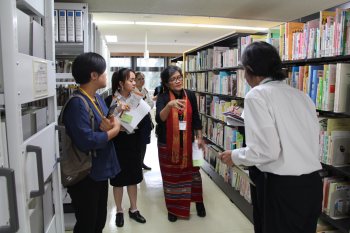 Visiting the Information Center for Women’s Education
Visiting the Information Center for Women’s Education
 Visiting the Women’s Archives Center
Visiting the Women’s Archives Center
On the second day of the seminar, country reports were presented. During the country report session, information was shared on the latest gender equality policies and issues involving the empowerment of women and girls in rural communities in the five Asian countries.
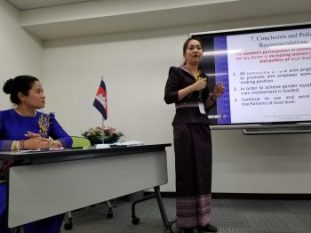 Country Reports
Country Reports
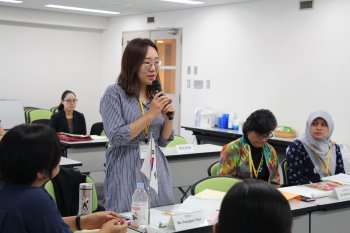
During their stay at NWEC, the seminar participants visited Garden Center Sunnyvale, which sells potted flowers, decorative plants, and gardening items in Yoshimi-machi, Saitama, in order to learn how a business with deep roots in the community is run. The assistant manager of the store, Ms. Midori Mamuro, talked to the participants. Based on her experiences studying in Denmark, Ms. Mamuro manages the store with the hopes of helping the culture of enjoying flowers in everyday life to take root in Japan as well. The seminar participants were particularly enthusiastic about taking pictures of the beautifully displayed seasonal flowers and hanging baskets in the spacious store.
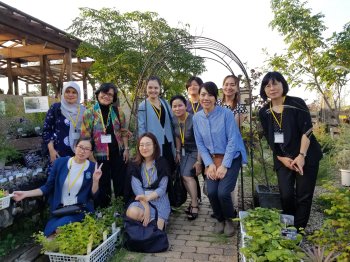 At Garden Center Sunnyvale
At Garden Center Sunnyvale
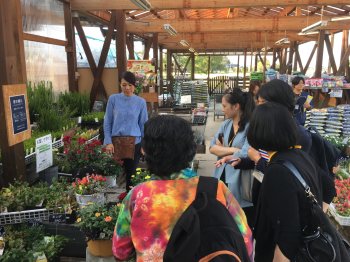
At the Ministry of Agriculture, Forestry and Fisheries, seminar participants attended a lecture on efforts related to the promotion of gender equality in agriculture being undertaken by the Japanese government. The “Nōgyō Joshi Project” is a scheme that links the knowledge that women farmers have acquired in their daily lives, work, and interactions with the natural environment to the technologies, knowhow, and ideas of companies that support the aims of the projects in the hopes that those links lead to the development of new products and services. There was also a presentation on “family management agreements,” which specify the work environments that make it easy for each member of a family that is involved in a family run farm. During the question-and-answer session, the participants asked wide-ranging questions such as “How are companies for cooperation in the Nōgyō Joshi Project selected?”, “What kind of measures do you think are effective for increasing the number of households that enter into family management agreements?”, “How should assistance best be provided for people who want to get into farming for the first time?”, and many more.
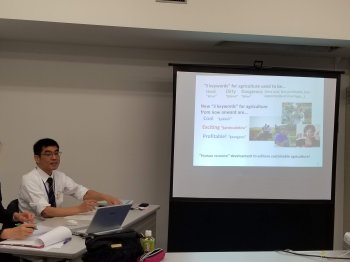 At the Ministry of Agriculture, Forestry and Fisheries
At the Ministry of Agriculture, Forestry and Fisheries
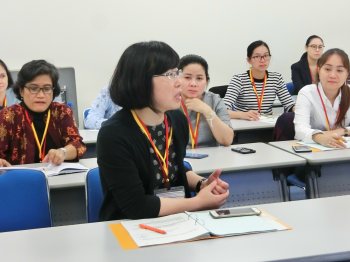
For the second half of the seminar, the participants travelled to the city of Yamagata and joined study tours. JA Tendo Agricultural Cooperative founded a women’s committee in 1974 for the purpose of deepening mutual cooperation and friendship among members and of advancing the agricultural cooperatives movement. There are now 372 active members. In 2015, a subcommittee of young women farmers (Fresh Ms. subcommittee) was established, aiming to contribute to stable community development. The latter holds screenings of films related to dietary education and other events. After the lecture, the participants were treated to imoni (a stew made of taro and meat) and other local specialties, and they were able to get their fill of delicacies from the Tohoku region.
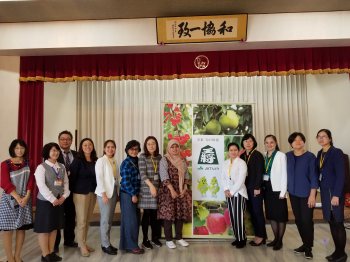 At JA Tendo
At JA Tendo
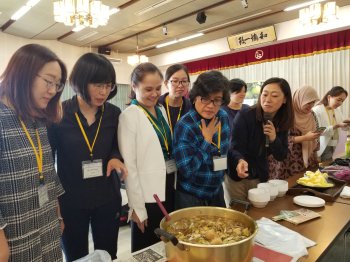
On the afternoon of the fourth day of the seminar, the group travelled to Naganuma Fruits Farm in the city of Kaminoyama, where they joined in an exchange of ideas and opinions with people involved in farming in Yamagata Prefecture. After receiving a briefing on the “Active Agri-women Program” by an extension specialist with the Agricultural Technology Section, Division of Agriculture, Forestry and Fisheries, Yamagata Prefecture, the participants heard from four women farmers who are members of the Nōgyō Joshi Project about how they got into farming and the issues they currently face. The ways in which these women got into farming are diverse, including marrying into a farming family, taking over the farms and orchards that their parents had run and starting new businesses, and becoming involved in farming when their husbands newly entered (the business). But through the discussions, issues that women farmers face became clear, such as having few opportunities to learn about new technologies or acquire specialized knowledge, having none to share concerns specific to women, and other such difficulties.
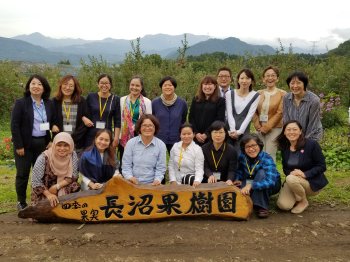 Interactive discussion with women farmers
Interactive discussion with women farmers
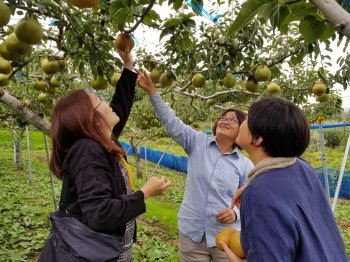
On the final day of the seminar, participants visited the Yamagata City Gender Equality Center (Fala), where they learned about initiatives by women’s facilities in Japan. Fala offers courses on gender equality, operates a library, and runs a consultation program. After touring the Center, one participant commented that she was impressed by the “parent-and-child room” where people could join courses with pre-school children, the daycare facility, and other features of the Center that were designed to make it easier for visitors raising children to use.
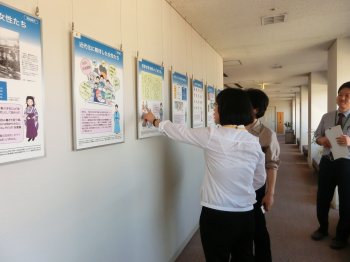 At the Yamagata City Gender Equality Center (Fala)
At the Yamagata City Gender Equality Center (Fala)
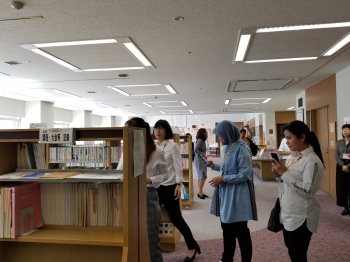
After touring Fala, the seminar participants attended a lecture about the efforts of the Yamagata Prefectural Gender Equality Center (Cheria). Cheria runs a series of workshops called “Cheria Juku” around the prefecture as a program to develop women as human resources who will lead in gender equality issues in their communities. On that day of the seminar the participants observed the “review and reflection” session for the last day of the “Cheria Juku Practical Course” being held at Fala, and the participants were able to interact with the students of the course.
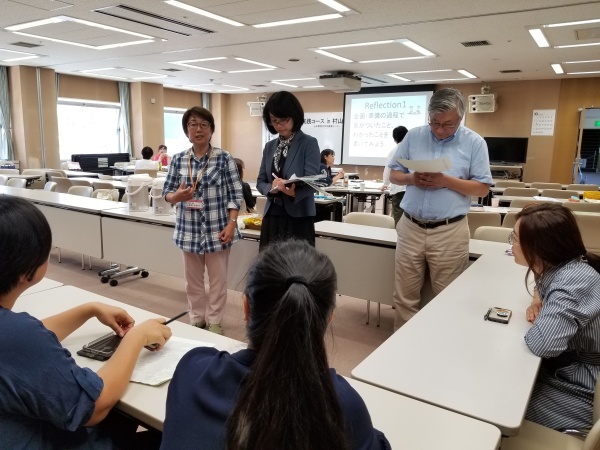 Observing Cheria Juku
Observing Cheria Juku
Of the review and reflection session, participants had such comments as, “Through exchanging thoughts with women farmers, I learned how they are taking action to overcome all kinds of difficulties, and was very impressed by that,” “It was very beneficial to have the opportunity to observe a human resource development seminar for women,” and “I was particularly impressed by Fala’s user-friendly facilities.” After attending a closing ceremony for the seminar, the participants embarked on their journeys back to their home countries on October 7th.
 At the closing ceremony
At the closing ceremony
The outcome of this program is published now under the title of “2018 Leader Seminar Report,” which outlines best practices of support for rural women and girls in the participating countries and Japan.
International Cooperation
- International Seminar
- FY2019 Seminar for Gender Equality Officers and Women Leaders in the Asia Region
- FY2018 Seminar for Gender Equality Officers and Women Leaders in the Asia Region
- FY2017 Seminar for Gender Equality Officers and Women Leaders in the Asia Region
- FY2016 Seminar for Gender Equality Officers and Women Leaders in the Asia Region
- FY2015 Seminar for Gender Equality Officers and Women Leaders in the Asia Pacific Region
- FY2014 Seminar for Gender Equality Officers and Women Leaders in the Asia Pacific Region
- FY2013 Seminar for Gender Equality Officers and Women Leaders in the Asia Pacific Region
- FY2012 Seminar for Gender Equality Officers and Women Leaders in the Asia Pacific Region
- FY2011 Seminar for Gender Equality Officer and Women Leaders in the Asia Pacific Region
- FY2010 Empowerment Seminar for Women Leaders in the Asia Pacific Region
- FY2009 Empowerment Seminar for Women Leaders in the Asia Pacific Region Final Report
- FY2008 Empowerment Seminar for Women Leaders in the Asia Pacific Region
- FY2007 Empowerment Seminar for Women Leaders in the Asia Pacific Region
- FY2006 Empowerment Seminar for Women Leaders in the Asia Pacific Region
- NWEC Global Seminar
- FY2025 NWEC Global Seminar: Addressing Technology-Facilitated Gender Based Violence (TFGBV): Approaches to Eradicate the Invisible Harm
- FY2024 NWEC Global Seminar: Gender Equality and Care
- FY2023 NWEC Global Seminar: Gender Mainstreaming & Strengthening Institutional Mechanism with Gender Perspective
- FY2022 NWEC Global Seminar: Does Digital Technology Advance Gender Equality?
- FY2021 NWEC Global Seminar: Combating Gender-Based Violence – “Building Back Better” from the Covid-19 Crisis
- FY2020 NWEC Global Seminar: Covid-19 and Gender
- FY2019 NWEC Global Seminar: Gender and Media
- FY2018 NWEC Global Seminar: Promotion of the Advancement of Women - What Japan can learn from Iceland about Gender Equality?
- FY2017 NWEC Global Seminar: Promotion for Advancement of Women Lessons from Germany
- FY2016 NWEC Global Seminar: Promotion for Advancement of Women –Lessons from Europe
- FY2015 International Symposium: Gender Equality and Women's Empowerment
- FY2014 International Symposium: Keys to Diversity and Women's Leadership
- FY2013 NWEC International Symposium:Gender Equality for Men
- FY2012 NWEC International Symposium:To Make a Society without Violence against Women a Reality
- FY2011 NWEC International Symposium
- FY2010 International Forum for Women's Empowerment
- FY2009 International Forum for Women's Empowerment
- FY2008 International Forum for Women's Empowerment Final Report3
- FY2008 International Forum for Women's Empowerment Final Report2
- FY2008 International Forum for Women's Empowerment Final Report1
- Cooperation with JICA
- FY2025 Knowledge Co-Creation Program (KCCP): "Promotion of Global Networking on Anti-Trafficking in Persons"
- FY2025 Knowledge Co-Creation Program "Eradicating Sexual and Gender-Based Violence (SGBV)"
- FY2025 Knowledge Co-Creation Program: Bangladesh “Strengthening Capacity to Address Gender-Based Violence"
- FY2024 Knowledge Co-Creation Program on "Promotion of Global Networking on Anti-Trafficking in Persons"
- FY2024 Knowledge Co-Creation Program "Eradicating Sexual and Gender-Based Violence (SGBV)"
- FY2023 Knowledge Co-creation Program "Promotion of Networking among ASEAN Countries on Anti-Trafficking in Persons”
- FY2023 Knowledge Co-Creation Program "Eradicating Sexual and Gender-Based Violence (SGBV)"
- FY2022 Knowledge Co-creation Program "Promotion of Networking among ASEAN Countries on Anti-Trafficking in Persons”
- FY2022 Knowledge Co-Creation Program "Eradicating Sexual and Gender-Based Violence (SGBV)"
- FY2021 Knowledge Co-creation Program "Promotion of Networking among ASEAN Countries on Anti-Trafficking in Persons”
- FY2020 Knowledge Co-creation Program "Promotion of Networking among ASEAN Countries on Anti-Trafficking in Persons”
- FY2019 Knowledge Co-creation Program "Promotion of Networking among ASEAN Countries on Anti-Trafficking in Persons”
- FY2018 Knowledge Co-creation Program "Promotion of Networking among ASEAN Countries on Anti-Trafficking in Persons”
- Issue-specific Training “Seminar on Promotiom of Networking among ASEAN Countries on Anti-Trafficking in Persons”
- Basic Information-Gathering Survey/Workshop Seminar on the Economic Independence for Women in Central America and the Caribbean (El Salvador/Dominican Republic)
- Regional Gender Seminar in Central and South America
- 2015 Issue-specific Training "Seminar on Promotion of Networking among Asian Countries on Anti-Trafficking in Persons"
- Seminar on the Promotion of Education for Girls and Women II
- International Conference/International Exchange
- Visit by Professor Hilado from the University of the Philippines Visayas
- Online meeting with Seisen International School elementary students
- Visitor: Mansfield Fellows
- Visitor:JICA Knowledge Co-Creation Program (KCCP) on "Women's Empowerment through Business for Central American Integration System (SICA) Member Countries"
- The 68th Session of the Commission on the Status of Women
- Visitor: Madam Sustjie Mbumba, First Lady of the Republic of Namibia
- Workshop of commemorating the donation of the Beate Shirota Gordon archive materials
- Meeting with Korean Women’s Development Institute (KWDI)
- The Coalition of Finnish Women's Associations (NYTKIS) Secretary General Ms. KAKKOLA’s Courtesy Call to Foreign Minister KAMIKAWA
- The Coalition of Finnish Women's Associations (NYTKIS) Secretary General Ms. KAKKOLA’s Japan Visit Program
- The 67th Session of the Commission on the Status of Women
- NGO CSW67 Forum
- Webinar with Korean Women’s Development Institute (KWDI)
- The 66th Session of the Commission on the Status of Women (Hybrid format)
- Online meeting with international graduate students from the Appropriate Technology course at the University of Tsukuba
- The 65th session of the Commission on the Status of Women
- Lecture "The Beate Sirota Gordon Archives at Mills College"
- Participation in 2nd AGenT
- The 64th session of the Commission on the Status of Women
- Dr. Wang from National Taiwan University visits NWEC
- Japan Network of Women Engineers and Scientists and The Japan Inter-Society Liaison Association Committee for Promoting Equal Participation of Men and Women in Science and Engineering: 9th Japan Korea China Women Leaders Forum for Science & Technology
- Researcher from the KWDI visits NWEC
- Visit by a delegation from the Socialist Republic of Vietnam Ministry of National Defense
- Briefing on the Reykjavik Index for Leadership
- Women's Archives Center Exhibition "Beate Sirota Gordon and gender equality in Japanese Constitution"
- Visit from the Guangxi Women’s Federation
- Participation in the 63rd Session of the Commission on the Status of Women
- 7th Global Forum on Gender Statistics
- FY2018 International Symposium hosted by Korean Institute for Gender Equality Promotion and Education “Gender Equality at Schools”
- Visit from All-China Women’s Federation(ACWF)
- Participation in the 62nd Session of the Commission on the Status of Women
- The 14th KIGEPE International Symposium “Empowering Women’s Leadership: expanding influence and innovation”
- Participation in the 61st Session of the Commission on the Status of Women
- Visit from the Batis Center for Women
- 2011 Asia Women Eco-Science Forum (a forum of science and engineering leaders in Japan, China and Korea)
- The 60th Session of the Commission on the Status of Women
- The 59th Session of the United Nations Commission on the Status of Women
- The 58th Commission on the Status of Women
- The 57th Session of the United Nations Commission on the Status of Women
- International Symposium: Gender Awareness Education for Sustainable Development
- Thirtieth Anniversary Programs
- Attendance at the Ceremony Commemorating the 25th Anniversary of the Korean Women’s Development Institute (KWDI)
- Japanese-Filipino children (JFC)* from the Philippines-based NGO “DAWN” visit the Center
- Visitors from Abroad to NWEC
- Research report on Multicultural Family Support in South Korea
- Workshop on Gender and Education: Life-long Learning for Women’s Empowerment
- Lecture Delivered by a Visiting Researcher
- Connections: Bringing Together the Next Generation of Women Leaders in Science, Technology, Engineering and Mathematics
- Conclusion of Memorandum of Understanding on Exchange and Cooperation with the Ministry of Women's Affairs, Royal Government of Cambodia
- Visit to Japan by the Minister of Women’s Affairs of the Royal Government of Cambodia
- KIGEPE Delegation Visit
- Officials of Ministry of Information and Communications of the Socialist Republic of Vietnam visited NWEC
- The 56th Commission on the Status of Women
- Dr. Barker's visit
- Multidisciplinary Intellectual Exchange for Women Leaders from the United States, Japan, South Korea and the Philippines
- Courtesy visit to University of Hawai`i
- Delegation of Board for the Advancement of Women, Ministry of Finance of the Socialist Republic of Vietnam visited NWEC
- Visit Korean Women's Development Institute (KWDI)
- Report on Participation in the 5th World Social Forum on Migration
- A group led by the Vice President of the Korean Women's Development Institute visited NWEC
- A disaster management specialist from India visits the Center
- Visit to the Korean Institute for Gender Equality Promotion & Education (KIGEPE) and others
- Secretary of State, Ministry of Justice, Kingdom of Cambodia visited NWEC
- Research conducted in the Republic of the Philippines
- Research on the Comparative Study of the Gender Equality Policy in Southeast Asian Countries in the Kingdom of Cambodia
- Ochanomizu University and A Canadian Women’s Study Researcher visited NWEC
- Aigyung Yang, Research Fellow and Former Director of Strategy Board for Women Friendly Policies of the Korean Women's Development Institute (KWDI) Visits NWEC
- Delegation of the Ministry of Defense of the Socialist Republic of Vietnam visited NWEC
- Delegation from the Women and Development Center, of the Vietnam Women's Union, Visited NWEC
- The "7th Asia-Pacific Forum on Development and Gender" was held in Seoul, South Korea
- HOME
- International Cooperation
- International Seminar
- International Seminar
- FY2018 Seminar for Gender Equality Officers and Women Leaders in the Asia Region

